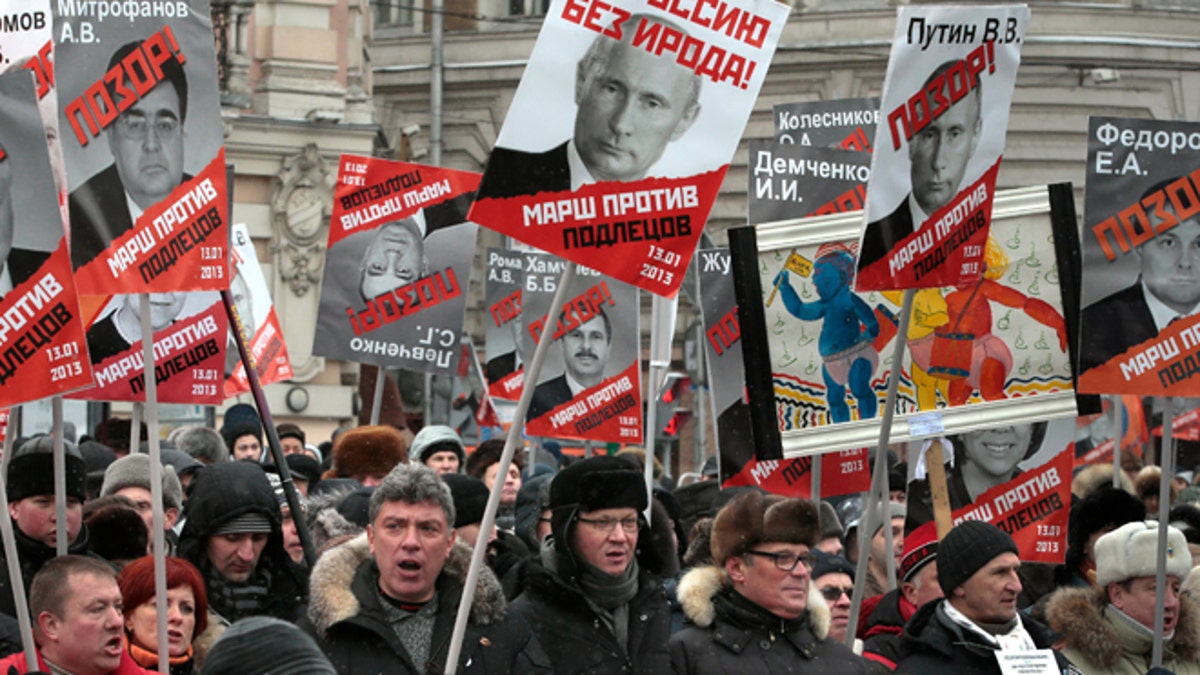
Some thousands of people are gathering in central Moscow for a protest against Russia's new law banning Americans from adopting Russian children, carrying posters of President Vladimir Putin and members of Russia's parliament who overwhelmingly voted for the law last month, with the word "Shame" written in red over the faces. (AP)
MOSCOW – Thousands marched through Moscow on Sunday to protest Russia's new law banning Americans from adopting Russian children, a far bigger number than expected in a sign that outrage over the ban has breathed some life into the dispirited anti-Kremlin opposition movement.
Shouting "shame on the scum," protesters carried posters of President Vladimir Putin and members of Russia's parliament who overwhelmingly voted for the law last month. Up to 20,000 took part in the demonstration on a frigid, gray afternoon.
The march was led by many of the same opposition figures who led the protest rallies that drew more than 100,000 people a year ago to demand free elections and an end to Putin's 12 years in power. Since Putin began a third presidential term in May, the protests have flagged as the opposition leaders have struggled to provide direction and capitalize on the broad discontent.
The adoption ban, which opponents argue victimizes children to make a political point, has stoked the anger of the same middle-class, urban professionals who swelled the protest ranks last winter. The same creative wit was once again on display on Sunday.
"Parliament deputies to orphanages, Putin to an old people's home," read one poster. Another showed Putin with the words "For a Russia without Herod."
Putin's critics have likened him to King Herod, who ruled at the time of Jesus Christ's birth and who the Bible says ordered the massacre of Jewish children to avoid being supplanted by the newborn king of the Jews.
Russia's adoption ban was retaliation for a new U.S. law targeting Russians accused of human rights abuses. It also addresses long-brewing resentment in Russia over the 60,000 Russian children who have been adopted by Americans in the past two decades, 19 of whom have died.
Cases of Russian children dying or suffering abuse at the hands of their American adoptive parents have been widely publicized in Russia, and the law banning adoptions was called the Dima Yakovlev Bill after a toddler who died in 2008 when he was left in a car for hours in broiling heat.
"Yes, there are cases when they are abused and killed, but they are rare," said Sergei Udaltsov, who heads a leftist opposition group. "Concrete measures should be taken (to punish those responsible), but our government decided to act differently and sacrifice children's fates for their political ambitions."
Those opposed to the adoption ban accuse Putin's government of stoking anti-American sentiments in Russian society in an effort to solidify support among its base, the working-class Russians who live in small cities and towns.
The adoption ban also revived anger over the December 2011 parliamentary election, which independent observers said was won by Putin's party through widespread fraud. A column of marchers on Sunday held a banner calling for the State Duma, the elected lower house, to be disbanded.
"The Duma that now adopts these kinds of laws is illegitimate. It was formed with the theft of 100 million votes," said opposition leader Vladimir Ryzhkov, a former Duma member who lost his seat when independent members were ousted in 2007. "It doesn't have the moral or political right to adopt laws for us. The disbanding of the Duma and the overturning of the law: That's why people, including me, came out today."
Just ahead of the weekend protest, Putin's spokesman sought to ease anger over the adoption ban by announcing that some of the dozens of adoptions already under way could go forward, allowing children who have already bonded with American adoptive parents to leave the country.
UNICEF estimates there are about 740,000 children not in parental custody in Russia, while about 18,000 Russians are on the waiting list to adopt a child. Since the law banning American adoptions was passed, Russian political and religious leaders have been encouraging Russians to adopt more children.
